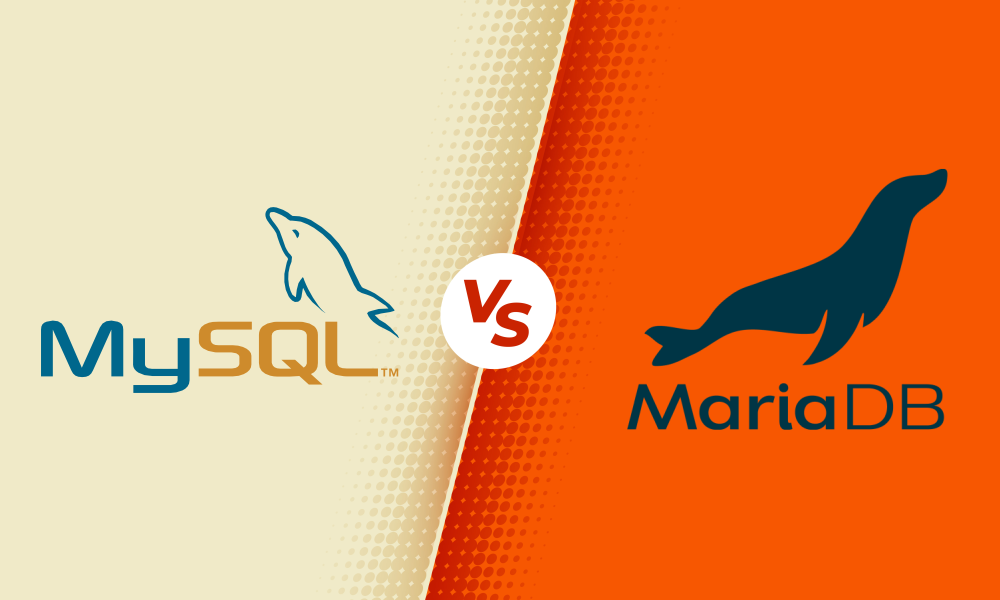Today, a website is the whole and sole of every business out there. When we say "website," the term "data" comes to mind. But do you know where this huge website's data is stored?
That's an excellent question! Yes! A database is essential for storing data and managing it properly. There are many options available, but MySQL and MariaDB are the two most popular relational database management systems and while they share a common origin, they are distinct in regard to certain features, security, performance, etc.
Both databases are open-source and extremely powerful! So, the question is, which one to choose for your web development journey! Here’s a blog that walks you through the main differences, MySQL vs MariaDB, alongside their similarities, pros and cons, and so much more. By reading the complete blog, you will have an idea which suits your needs the best!
Let’s dive in right away!
An Overview of MySQL
MySQL uses Structured Query Language (SQL) to function as an open-source relational database management system (RDBMS). Since its first development in 1995, the software has gained a lot of popularity. It is the foundation of applications and webpages for a reason: it is fast and simple to use.
MySQL excels at handling large volumes of data and is used in developing small and complex database applications. Later, MySQL was acquired by Oracle, and due to some issues with the database usage, MariaDB was developed.
Some of the prominent companies using MySQL are:
- Airbnb
- YouTube and more
Pros and Cons of MySQL
Pros
- Oracle supports it with solid enterprise support.
- Has a vast developer community
- Ideal for mission-critical systems
Cons
- Slower than Maria DB in some cases
- Limited JSON and advanced SQL functionality
An Overview of MariaDB
Let’s head over to MariaDB! MariaDB is a modification of MySQL developed in 2009 by the original developers in response to Oracle’s acquisition. It is designed to be highly compatible with MySQL; however, it is today a stand-alone database and outperforms MySQL in terms of speed, robustness, and scalability.
MariaDB helps to make queries run faster due to its special features, and it can store data in a better way. MariaDB uses all the client protocols similar to MySQL, along with its data and table definitions. The main goal is to let MySQL users switch to the new MariaDB platform with ease.
Following are some of the key features of MariaDB:
- MCS for analyzing data
- Galera Cluster for copying data
- MaxScale for running things
Pros and Cons of MariaDB
Pros
- Fully open source
- Has faster performance and dynamic features
- Galera Cluster provides full scaling and replication.
- Strong advanced SQL and JSON functions that the developer will enjoy.
Cons of MariaDB
- Less enterprise backing to rely upon compared to Oracle
- Some tools or plugins may still be more MySQL-driven
Similarities Between MySQL and MariaDB
As MariaDB was forked from MySQL, there are a range of similarities between the two relational database management systems. Both use the same structured query language, enabling the naming of conversations and more. Let’s discuss them below:
1. ACID Compliance
Both MySQL and MariaDB are ACID compliant, which refers to (Atomicity, Consistency, Isolation, Durability) and ensures that transactions are correct, reliable, and safe.
2. Directory Layout
Another interesting similarity between MariaDB and MySQL is the organization of files and folders. It’s completely identical. Folder names and formats have a similar structure, alongside the configuration files.
3. Open Source
Both database platforms are open-source, built by strong developer communities. MySQL offers a free GPL-licensed version, with a paid enterprise edition by Oracle. MariaDB is fully open source and available on GitHub.
4. Replication Features
Knowing the replication choices available is essential when developing large-scale applications. Both master-slave and master-master replication topologies are supported by MariaDB and MySQL. Options for replication are essential for maintaining database availability and synchronization.
5. Security Features
Both MySQL and MariaDB support SSL/TLS, offering a high level of protection to your sensitive data.
A Rundown of Key Differences MySQL vs MariaDB
Compatibility
One of the most important factors for businesses looking to merge or move databases is compatibility. MariaDB is a suitable choice for businesses switching from the Oracle platform because it also has PL/SQL in its features. Furthermore, MariaDB and MySQL can work with one other's data files, which makes migrations simpler and less downtime.
Database Deployment
MySQL is written in both C and C++ and works with all operating systems. On the other hand, MariaDB is a "one-step" upgrade of MySQL, which is written in languages other than C and C++, such as Perl and Bash.
JSON Support
JSON has become extremely important for modern web applications due to its comprehensive features. Even though both databases support JSON, MariaDB offers extended functionality. It comes with critical JSON functions such as storage, validation, retrieval, and more.
Support
Support is where everything comes down. Whenever you have a query or need help running your applications smoothly, you need reliable and prompt support immediately. When talking about the support of MariaDB and MySQL, let’s see who wins.
MySQL offers a helpful resource backed by Oracle’s support for enterprise-class users. MariaDB also comes with excellent community support, active forums, detailed documentation, and more to help you with any of the technical concerns.
Data Masking
If you deal with sensitive data, then data masking is crucial. MariaDB provides subscriptions for MaxScale with MariaDB TX and MariaDB AX. This helps in boosting security with data in flight. MySQL incorporates fixed-function style solutions that allow data masking with generic or specialized data.
Thread Pooling
Thread pooling helps databases scale by reusing threads for new connections. MariaDB’s community edition includes a thread pool plugin that supports over 200,000 connections, while MySQL offers its plugin only in the enterprise version and handles fewer connections.
Storage Engines
MariaDB supports a range of storage engines such as InnoDB, Aria, TukoDB, and MyRocks. Even though MySQL supports different engines, its default storage engine is InnoDB.
Use Cases
When to Choose MySQL
- Websites with moderate traffic (WordPress, Joomla, Drupal)
- Small to mid-sized applications with stability and consistency
- Organizations that want enterprise-level support from Oracle
When to Choose MariaDB
- High-traffic eCommerce websites or apps need excellent performance
- Data-intensive applications or apps that require heavy volumes or extensive analytics
- Organizations upgrading from Oracle databases
- Developers seeking to collaborate with community-driven protocols, particularly those with newer releases and community-oriented approaches.
MariaDB vs MySQL: Which Should You Choose?
MySQL, owned by Oracle, is ideal for those who want to go with a database that’s updated regularly, has good support and more. Alternatively, MariaDB has been buzzing as an open-source platform with a backed by a contribution from the Community. Even though the development plan is community-driven, MariaDB has become a good choice among the developers.
Wrapping Up Our Rundown of MySQL vs MariaDB
So, in this blog, we have discussed everything about MySQL vs MariaDB. MySQL is top in popularity and provides high-end reliability, support and more for your application. In contrast, MariaDB, a MySQL fork, is meant for situations where performance and security are required (like open-source projects). Ultimately, MySQL or MariaDB comes down to your project specifications and needs.
We publish all the latest blogs around the tech landscape, visit us now to explore!
Frequently Asked Questions
1. What is the use of MariaDB?
In addition to web apps, software, and many more applications, MariaDB is utilized for data warehousing and e-commerce storing and management.
2. Is MariaDB better than MySQL?
The answer will ultimately depend on your needs, and it is entirely up to you. For instance, MariaDB may be able to outperform MySQL thanks to certain complimentary functional and performance capabilities.
3. Can I use MariaDB on Windows?
Of course! MariaDB can be easily installed and used on Windows.
Recommended For You:





